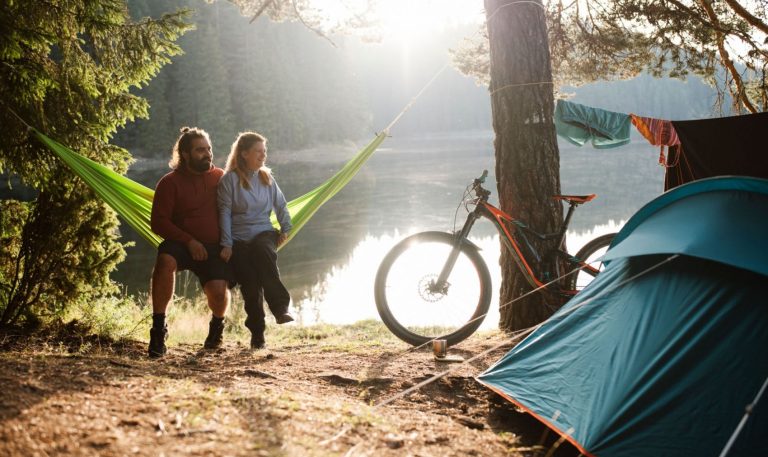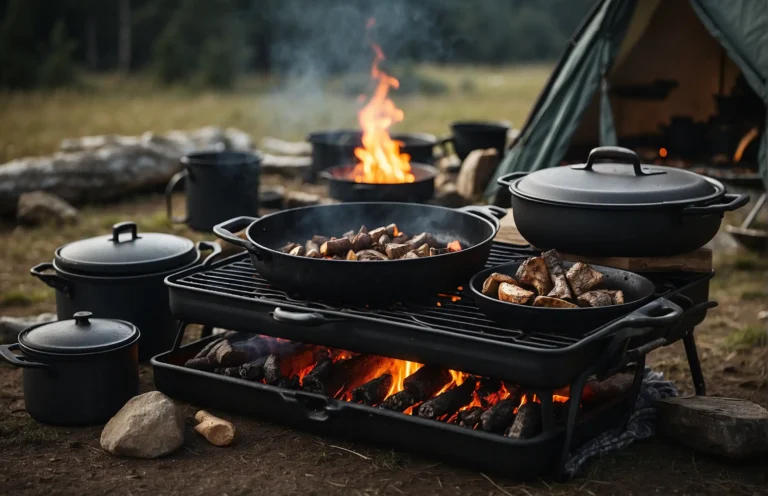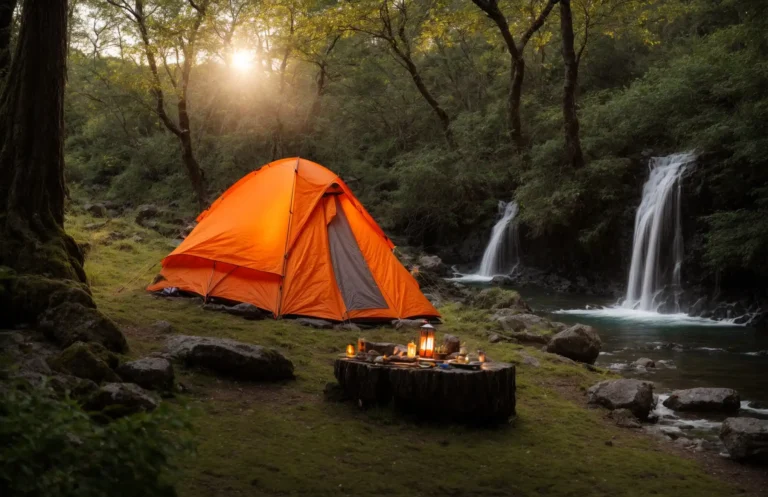To take eggs camping, pack them in a sturdy container or use powdered eggs. Ensure the container is shockproof to prevent breakage.
Eggs are a versatile and nutritious ingredient perfect for camping meals. They provide essential protein and can be cooked in various ways, from boiled to scrambled, suiting any camper’s taste. Planning a camping trip necessitates compact, non-wasteful packing. Carrying eggs requires special consideration to avoid messes in your gear.
Containers designed for camping, such as egg carriers or shockproof cases, offer a reliable solution to transport your eggs safely. Alternatively, powdered eggs present a convenient, lightweight option without the worry of breaking. Including eggs in your camping food list means you can enjoy a hearty breakfast or add substance to a quick lunch while surrounded by nature. Ensuring that eggs reach your campsite intact guarantees a pleasant and delicious outdoor dining experience.
Introduction to Camping With Eggs
Embracing the great outdoors becomes a culinary adventure when eggs enter the camping menu. Loaded with versatility and essential nutrients, eggs can indeed transform a mundane campfire meal into a feast fit for a camper. Yet, to enjoy their freshness and flavor in nature’s lap, a bit of foresight and preparation is paramount.
Eggs: Nutritional Powerhouse For Campers
Beyond their reputation for versatility, eggs pack a significant nutritional punch. Each shell encloses a wealth of protein, vitamins, and minerals essential for sustaining energy during outdoor activities. A single egg provides:
- High-Quality Protein – to aid in muscle repair and growth
- Vitamins A, D, and B12 – for maintaining eye health, bone strength, and energy metabolism
- Choline – important for brain function and overall nervous system health
- Antioxidants – such as lutein and zeaxanthin for eye health
Incorporating eggs into your camping diet means not only delicious meals but also a steady supply of energy to fuel your adventures.
Challenges of Transporting Eggs Outdoors
However, transporting eggs into the wild is not without its hurdles. Their fragile nature poses the biggest challenge, necessitating secure and innovative packing solutions. Consider these factors:
| Challenge | Solution |
|---|---|
| Breakage | Invest in a sturdy egg carrier or use individual bubble wraps |
| Temperature Fluctuations | Keep eggs cool with insulated bags and ice packs |
| Space Conservation | Pre-cracking eggs and storing in sealed bottles can save space |
| Ease of Use | Mark hard-boiled eggs to differentiate from raw ones |
With these solutions, campers can overcome the common difficulties associated with egg transportation, ensuring that these nutritional gems reach the campsite intact and ready to be enjoyed.
Selecting the Right Eggs For Your Trip
When embarking on your next camping adventure, selecting the right type of eggs is crucial for a successful and enjoyable trip. Eggs are a camping staple due to their nutritional value and versatility, but not all eggs are equal when it comes to transportation and longevity in the great outdoors. Understanding the nuances between different options ensures you’ll enjoy fresh, tasty eggs by the campfire.
Fresh Vs. Store-bought Eggs
Deciding between fresh and store-bought eggs depends largely on the length of your trip and the available amenities. Fresh eggs, straight from the farm, often come with a natural protective coating called the ‘bloom,’ which keeps them safe without refrigeration for a longer period. They are an excellent choice for short-term camping provided they’re kept cool and dry.
In contrast, store-bought eggs have been cleaned and refrigerated, removing the protective bloom. However, they come with a guaranteed level of safety in terms of quality control and are less likely to harbor contaminants. Store-bought eggs require consistent refrigeration, making them suitable for campsites with cooler facilities.
Understanding Egg Labels For Camping Purposes
When shopping for eggs to take camping, labels play a significant role in determining their suitability. Here’s a guide to understanding common egg labels:
- Cage-Free: hens can freely roam a barn, but not necessarily outside. Suitable for ethical concerns but not different in terms of camping preparations.
- Free-Range: hens have some access to the outdoors. These eggs come at a premium and generally have no added benefit over cage-free in terms of camping utility.
- Organic: hens are fed organic feed and have outdoor access. While they cater to personal preferences for organic produce, they don’t offer any specific advantage for campers over conventional eggs.
- Pasteurized: these eggs are heat-treated to kill bacteria and are the safest option in terms of food safety—an excellent choice for raw consumption, like in mayonnaise or dressings.
Keep in mind that certifications such as ‘Certified Humane’ or ‘Animal Welfare Approved’ ensure ethical treatment of the hens but have little to no impact on the egg’s portability or shelf life for your trip.
It’s important to select eggs that will not only taste good but also withstand your camping conditions. Consider your journey’s duration, climate, and storage availability, then choose the eggs that best meet those needs.
Packing Strategies For Eggs
Heading out on a camping trip doesn’t mean you have to bid farewell to the delicious taste of fresh eggs in the morning. A little planning, the right equipment, and some clever tactics can help you transport eggs safely to your campsite. Follow these guidelines to ensure your eggs arrive intact and ready to cook on the open fire.
Choosing the Right Container
The first step in successfully transporting eggs is selecting an appropriate container.
- Plastic Egg Carriers: These containers are designed specifically for camping and can be found at most outdoor supply stores. They offer individual slots for each egg, which minimizes movement and reduces the risk of breakage.
- Padded Coolers: If you don’t have a plastic egg carrier, line a small cooler or lunch box with bubble wrap or a soft towel, and nestle the eggs inside for a DIY solution.
- Original Cartons: Foam or cardboard egg cartons can work, but reinforce the lid with tape and consider adding extra cushioning inside each compartment for enhanced protection.
Preventing Breakage: Tips and Tricks
Once you’ve chosen your container, focus on preventing breakage during the journey.
| Method | Description |
|---|---|
| Padding | Add padding around and between the eggs to absorb shock from bumps and jolts. |
| Fill Gaps | Use soft materials like paper towels or cotton balls to fill any gaps and prevent eggs from moving within the container. |
| Securing Lid | Ensure the container’s lid is secure, using rubber bands or tape if necessary to prevent accidental openings. |
Temperature Control During Transit
Managing temperature is crucial when transporting eggs, especially in warmer climates.
- Pack with Cold Packs: Place cold packs or frozen water bottles in the cooler alongside the egg container to keep them cool without risk of dampening.
- Avoid Direct Sunlight: Position the cooler in a shaded area of your car or under a blanket to shield eggs from the heat and maintain a more consistent temperature.
- Insulated Coolers: Using an insulated cooler helps maintain temperature longer, ensuring the eggs stay fresh until you reach your camping destination.
Learn: How to Stay Warm Camping in a Tent
Cooking Eggs at the Campsite
Imagine waking up to the serene beauty of the wilderness, with the first rays of the sun cutting through the mist. What could make this picture perfect? A delicious, well-cooked egg breakfast at your campsite. Cooking eggs while camping not only offers a hearty start to your adventurous day but also brings the comfort of home to the great outdoors. Prepared correctly, eggs can be as versatile over a campfire as they are in your kitchen at home. From scrambled to poached, there’s an egg for every camper’s taste!
Campfire Egg Recipes For Outdoor Cooking
Fancy a gourmet breakfast amidst the chirping of birds? Check out these mouth-watering campfire egg recipes:
- Skillet-Scrambled Eggs: Whisk your eggs with a pinch of salt and pour them into a hot, buttered skillet. Cook over the campfire, stirring occasionally.
- Campfire Omelette: Wrap eggs, cheese, and your favorite fillings in foil and cook over the coals for a no-mess breakfast.
- Fireside Egg and Potato Hash: Combine diced potatoes, onions, and mixed veggies in a skillet. Crack eggs over the top and cook until set.
Tools and Techniques For Campsite Egg Preparation
Efficiently preparing eggs at your campsite boils down to having the right tools and mastering a few techniques:
| Tool | Use |
|---|---|
| Cast Iron Skillet | Ideal for fry-ups and scrambled eggs |
| Portable Stove | For controlled cooking, perfect for omelets |
| Foil | Great for omelette packets and easy clean-up |
| Heat Resistant Gloves | Protects hands when cooking over an open fire |
Clean-up and Leave No Trace Practices
Maintain the pristine condition of nature with these clean-up and leave no trace practices:
- Eggshell Disposal: Pack eggshells out with you, as they do not decompose quickly.
- Eco-friendly Soap: Use biodegradable soap for washing your cookware and utensils.
- Waste Containment: Keep waste contained until you can dispose of it properly off-site.
Remember to scour any traces of your meal, leaving the campsite just as you found it, ensuring that wildlife stays safe and the beauty of the outdoors remains unspoiled for future adventurers.
Alternative Solutions: Egg Substitutes and Preparations
Exploring alternative solutions for incorporating eggs into your camping meals can greatly simplify your outdoor cooking experience. Through egg substitutes and varied preparations, you’ll find options that cater to ease of transportation, reduced perishability, and convenience without compromising your much-loved breakfast dishes.
Using Powdered Eggs For Ease and Convenience
Powdered eggs are an ultra-convenient substitute to traditional eggs. They don’t require refrigeration and are extremely lightweight, a prized feature when packing for camping. Here’s how to make the most out of this egg alternative:
- Choose high-quality powdered eggs for the best taste and nutritional value.
- Experiment with rehydration ratios at home to find your preferred consistency.
- Store them in airtight containers to prevent moisture during your camping trip.
- Consider pre-mixing with dried ingredients for pancakes or omelets for time-saving meal preparation.
Pre-cooked Options: Boiled and Scrambled Eggs
Bringing pre-cooked eggs is a surefire way to enjoy eggs while camping without the fuss. Here are a couple of methods:
| Preparation Type | Convenience Level | Storage Instructions |
|---|---|---|
| Boiled Eggs | High | Keep in the shell, store in a cool container |
| Scrambled Eggs | Medium | Cool and place in a sealed container |
By boiling eggs beforehand, you reduce preparation time and ensure easy, mess-free eating. Scrambled eggs can be made luxurious by adding cheese or veggies and then reheated on a camp stove for a quick meal.
Planning Meals Around Egg Longevity
When selecting eggs for your camping trip, remember that not all eggs are created equal in terms of longevity. Here’s a simple guide:
- Fresh, uncracked eggs can last 1-2 weeks if stored in a cool, dark place.
- Hard-boiled eggs, kept in the shell, stay fresh for about a week.
- Keep track of the pack date when purchasing store eggs to estimate freshness.
By mindfully planning, campers can ensure they enjoy eggs in their freshest state throughout their adventure.
Conclusion
Embarking on a camping trip doesn’t mean leaving the comforts of a delicious egg breakfast behind. With the right packing strategies and tools in hand, you’ll ensure your eggs arrive intact and ready for the campfire. Remember, preparation is key to enjoying nature’s protein-packed wonder amidst the great outdoors.
So pack up, head out, and start your mornings with the satisfaction of a well-made campsite egg. Enjoy your adventure with every savory bite! Stay connected with Outdoor Awaits for latest camping contents.






